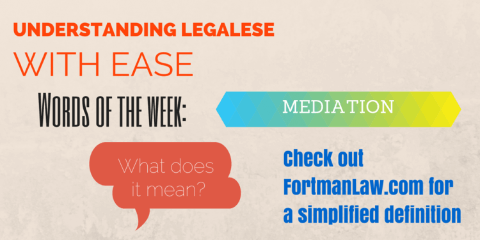
The definition of mediation is:
Intervention; interposition ; the act of a third person who interferes between two contending parties with a view to reconcile them or persuade them to adjust or settle their dispute. In international law and diplomacy, the word denotes the friendly interference of a state in the controversies of others, for the purpose, by its influence and by adjusting their difficulties, of keeping the peace in the family of nations.
(Source)
So what does it mean?
Mediation happens outside of court in an attempt to get the matter at hand taken care of before going to Court, or if already in Court, going all the way to trial. The Court process will generally take a lot longer and cost a lot more money than mediation.
Mediation is essentially the use of mediator, a neutral third party, to try and reach a resolution to the claims of the parties. It should be noted that the mediator is not a final authority. He or she facilitates CONFIDENTIAL discussions between the contending parties with the goal of guiding the parties to a resolution.
Mediation is often confused with arbitration. The difference with mediation is that a mediator does not have the authority to make a decision for the parties, while an arbitrator has the ability to make a legally binding decision for the parties. Another important difference is that certain cases can be forced into arbitration (see Arbitration clause) while mediation is an optional method that the contending parties can choose to try. If mediation fails, the case can still go through the Court system for resolution.
All in all, if both parties agree to try and mediate the claims at issue, it is worth trying!